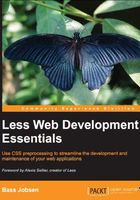
What this book covers
Chapter 1, Improving Web Development with Less, shows how CSS3 brought advanced functions such as gradients, transitions, and animations to web designers. It also explains how, on the other hand, CSS code became more complex and difficult to maintain. Less helps you make your CSS maintainable, reusable, and prevent code duplications.
Chapter 2, Using Variables and Mixins, explains why variables allow you to specify widely-used values in a single place and then reuse them throughout the style sheet, thus making global changes as easy as changing one line of code. Mixins allow you to embed all the properties of a class into another class by simply including the class name as one of its properties. The chapter also explains what parametric mixins are and how to use them.
Chapter 3, Nested Rules, Operations, and Built-in Functions, explains the use of nested rules for making inheritance clear and for making shorter style sheets. The chapter also explains how to create complex relationships between properties and how to use the built-in functions of Less.
Chapter 4, Avoid Reinventing the Wheel, teaches you how Less code and mixins can become complex because they handle different browsers and devices. The chapter also explains prebuilt mixins and other sources that help you (re)use them.
Chapter 5, Integrate Less in Your Own Projects, teaches you how to organize your files for new projects or get the projects you maintain ready for using Less.
Chapter 6, Bootstrap 3, WordPress, and Other Applications, explains what Bootstrap is and shows the strength of using Less with Bootstrap. The chapter also teaches you how to build web applications with Less or integrate it in your WordPress themes.